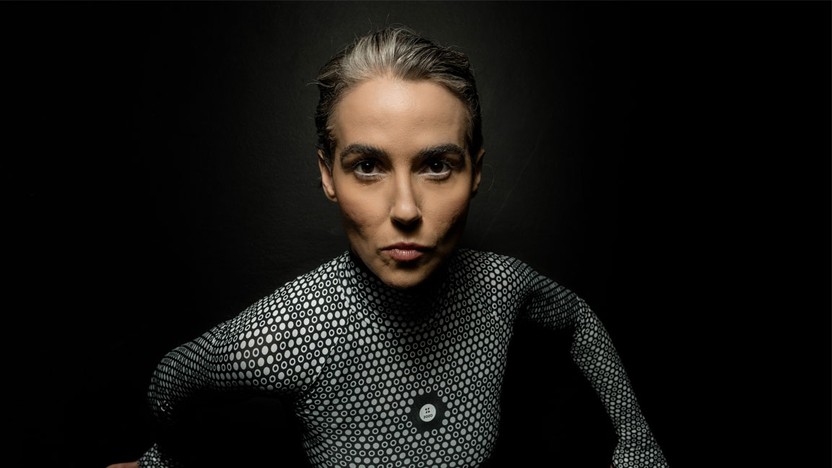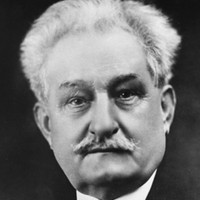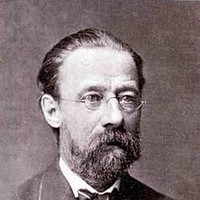Assad, Janáček and Smetana

Sponsored By
- January 12-13, 2024


Sponsored By


(Duration: 18 min)
Leoš Janáček was born into a musical family in Moravia, a region that now forms the eastern portion of the Czech Republic. At 11, he left home for the Queen’s Monastery in Brno, where he excelled as a chorister. After studies in Prague and Vienna, he established himself in Brno as a teacher, choir director, critic and musicologist. The 1904 premiere in Brno of his second full-length opera, Jenůfa, did little for his composing career, but a revival staged in Prague in 1916 finally pushed Janáček into the international limelight.
Janáček composed Mládí in 1924, around the time of his 70th birthday, and during the interval between two operas that have become repertoire staples: The Cunning Little Vixen and The Makropulos Affair. Mládí (Youth) looked back at the composer’s own childhood, with folk-like tunes and lighthearted melodies rendered in the breezy tones of a wind sextet.
In his operas, Janáček mastered the technique of shaping his vocal lines to the natural contours of the spoken word, and he utilized the same principle in this instrumental work, tracing the main theme to match the tone of the phrase, “Mládí, zlaté mládí!” or, “Youth, golden youth!” This figure reappears throughout the suite, imparting a playful, almost teasing tone.
The second movement, in an Andante sostenuto tempo, is the most reserved, with its modal melody first intoned by the bassoon alone. The third movement borrows a piccolo themes from a short work Janáček composed earlier in 1924, March of the Blue Boys, a reference to the blue uniforms he wore along with other young choir singers. The finale spins out new possibilities from the “Youth, golden youth” gesture while requiring the winds to execute virtuosic, rapid-fire tonguing.
Aaron Grad ©2024

(Duration: 12 min)
The co-commission of Clarice Assad’s The Evolution of AI is part of New Music USA’s Amplifying Voices program, which fosters collaboration and collective action between US orchestras and composers toward racial and gender equity in classical music. Amplifying Voices is powered by the Sphinx Venture Fund, with additional support from ASCAP, the Sorel Organization, the Virginia B. Toulmin Foundation, and The Wise Family Charitable Foundation. For more information on the Amplifying Voices program, visit Amplifying Voices – New Music USA
The Evolution of AI is a contemporary musical composition that delves into the intricate interplay between human artistry and artificial intelligence. The piece invites the listener on a journey that explores and questions the boundaries of creativity and the profound implications of human and artificial intelligence (AI) collaboration. The work is written for chamber orchestra, electronics and a human performer acting as a hybrid human-AI machine inside a musical experiment. It is not the machine's first time around, though. The first movement, titled Reboot, hints at the idea that this hybrid being has existed before. The Evolution of AI is four movements, performed without interruption.
I. reboot: The journey begins with the machine's awakening, a process of rebooting its electronic consciousness. This movement serves as the inception of our narrative, embodying the raw energy and unpredictability of a technological rebirth.
II. data collection: As the machine-human hybrid comes to life, it engages in a unique and dynamic dialogue with the chamber orchestra. Gestures and interactions between the performer and the orchestra capture the initial data assimilation, reflecting the intriguing moment when technology and human expression merge.
III. machine learning: The next phase marks the assimilation of vast musical knowledge from Western music repertoire. The machine-human hybrid absorbs, interprets and adapts traditional and contemporary compositions — all while integrating its newfound wisdom into an evolving musical landscape.
IV. creation: The fourth movement, sets the stage for an intriguing finale. As the AI hybrid machine extends its astonishing ability to compose in real-time, it ventures into uncharted territory, producing music with unprecedented speed. Yet, an unexpected twist looms on the horizon. With every note played, the machine's energy depletes, and its survival hangs in the balance. Will its creative brilliance culminate in triumphant innovation or remain a bittersweet enigma? As the music crescendos and the machine's energy dwindles, its final moments echo the unstable and evolving relationship between humanity and artificial intelligence.
Clarice Assad ©2023

(Duration: 27 min)
Bedřich Smetana, born in a small Bohemian castle town, came into his own as a composer at a time when his country was pushing back against Austrian political and cultural influence. He devoted himself to studying Czech (having grown up speaking and writing mainly in German), and his Czech-language operas helped bolster a new theater scene in Prague. Even the sudden loss of his hearing in 1874 did not halt Smetana’s drive to establish a Czech musical legacy; he still assembled a monumental collection of symphonic poems in honor of his homeland, and he added three more operas before he died a national hero in 1884.
Smetana wrote very little chamber music, even though he had played violin in a string quartet in his youth. Returning to chamber music in 1876 after a twenty-year gap, his String Quartet No. 1 (From My Life) took shape as an unprecedented musical autobiography. “The first movement depicts my youthful leanings toward art, the Romantic atmosphere, the inexpressible yearning for something I could neither express nor define, and also a kind of warning of my future,” Smetana explained a letter he sent to a friend in 1878. The viola delivers a full-throated first statement of the impassioned primary theme.
Instead of a typical scherzo, the second movement mimics the style of a polka. For Smetana, “this music brings to my mind the joyful days of youth when I composed dance tunes and was known everywhere as a passionate lover of dancing.” The Largo sostenuto slow movement, he wrote, “reminds me of the happiness of my first love, the girl who later became my first wife.”
Lively textures redolent of folk music and shuddering memories of the first movement’s main theme stand out in a finale that, in Smetana’s words, “describes the discovery that I could treat national elements in music, and my joy in following this path until it was checked by the catastrophe of the onset of my deafness, the outlook into the sad future, the tiny rays of hope of recovery; but remembering all the promise of my early career, nonetheless a feeling of painful regret.”
This performance features a new arrangement commissioned by The Saint Paul Chamber Orchestra. “The piece is massive in concept with thick chordal writing,” writes arranger Daria Adams, “and it is crying out for more sound, more instruments. To honor Smetana’s desire for intimacy, I have focused this arrangement on the idea that the orchestra is a family, all telling this story together. In any family, all the members have their own opinions, so I have given solo bits to players all over the ensemble, each adding their voice to the conversation.”
Aaron Grad ©2024
Learn more about our Sandbox Residency at thespco.org/Sandbox.
The co-commission of Clarice Assad’s The Evolution of AI is part of New Music USA’s Amplifying Voices program, which fosters collaboration and collective action between US orchestras and composers toward racial and gender equity in classical music. Amplifying Voices is powered by the Sphinx Venture Fund, with additional support from ASCAP, the Sorel Organization, the Virginia B. Toulmin Foundation, and The Wise Family Charitable Foundation. For more information on the Amplifying Voices program, visit Amplifying Voices – New Music USA. Additional support provided by Elizabeth and Justus Schlichting.
Get driving directions and find nearby parking.
Find dining options close to the venue.
View seating charts to find out where you'll be seating.
SPCO concerts are made possible by audience contributions.
For exclusive discounts, behind-the-scenes info, and more:
Sign up for our email club!
